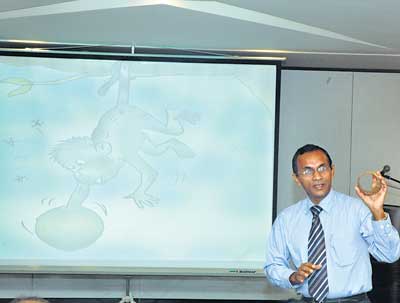
Ways of making your money workMore often than not most people tend to spend whatever they earn or more. Savings are important for unexpected emergencies or major life changes, but many just can’t seem to put some cash away for a rainy day.
The Sunday Times Business Club on Thursday had an interesting session with Preethiviraj de Silva, management consultant and Finance Director at Wijeya Newspapers Ltd on these issues and how to stop living from pay cheque to pay cheque. It was the first meeting at the Cinnamon Grand Colombo, the club’s new ‘home’ after being hosted for the past seven years by the Trans Asia hotel. Club President Chaturanga Perera, echoing the views of others, said the Trans Asia Hotel had provided the club a ‘warm’ home where some interesting discussions and presentations on the country’s future and corporate sector were held. “We thank the management of Cinnamon Grand for consenting to be our new host hotel,” he said after a brief opening ceremony. Kicking off the presentation, De Silva said that it is important to understand that money is a deadly thing to handle before learning to save. “Money is a wonderful servant, but a deadly master,” he said adding that many who live from pay cheque to pay cheque think that the next increment will solve all their problems. “Among the popular ways of becoming wealthy as dreamt by most is winning a lottery, marrying someone rich or even stealing, but what is important is not how much you earn, but how much you save,” De Silva said, adding that lesson number one to achieving financial freedom is saving 10 percent of what you earn. “Pay yourself first, before you pay others” he advised. “Take care of your savings. Get advise from people who are sound in what they practice and do not put your money in ‘unsound’ financial institutions,” he said. He further advised that it is important to add on to the savings. “It should generate more returns. Build an army of children (investments) who will work for you,” he said. He pointed out that some increase their spending when the income increases. “This is mostly in developed countries where some people increase spending and work harder and harder to earn more money to pay their bills, but the wise one saves more when his income increases,” he said. He said that it is important not to buy things you do not need. De Silva said that it is important to prepare a budget and more important to stick to it. “The purpose of a budget is to find out where the money is coming from, where it is going, what the leaks are and above all to maintain financial discipline,” he said. He said that a budget will not do you any good if you do not follow it religiously. “Build some self-discipline, and remember why you’re on a budget in the first place,” he said. De Silva pointed out that building a house is also a way of saving. “Invest in an insurance policy and if you can, save a little more than the 10 percent that you originally set out to save.” he said. He stressed that enhancing skills to help earn more or continuous learning is also a long term insurance to financial freedom. He further said that it is important to delay luxuries such as flashy cars, electronic equipment, expensive clothes etc. He advised never to loan cash ‘you cannot afford to lose and to ever borrow money that you cannot repay.’ |
| || Front
Page | News
| Editorial
| Columns
| Sports
| Plus
| Financial
Times | International
| Mirror
| TV
Times | Funday Times|| |
| |
Copyright
2007 Wijeya
Newspapers Ltd.Colombo. Sri Lanka. |
